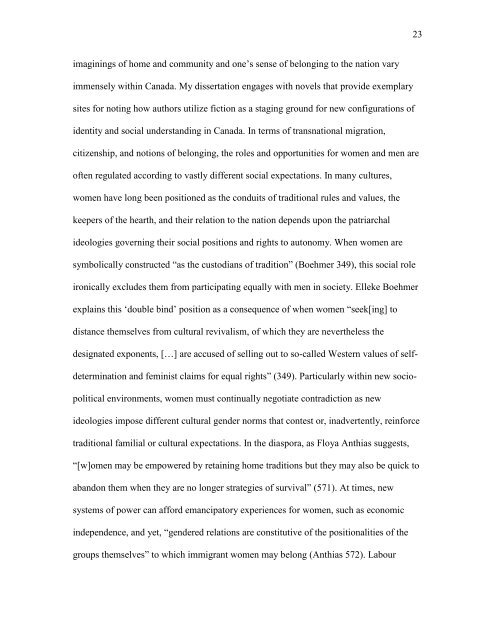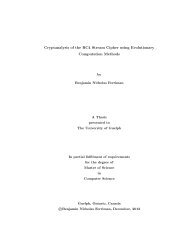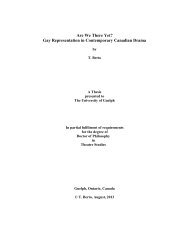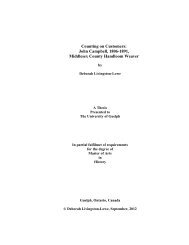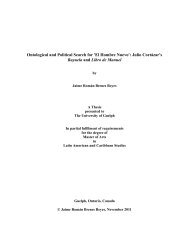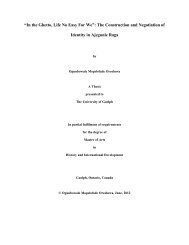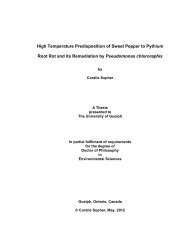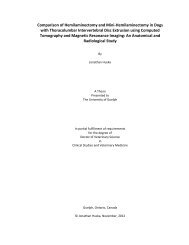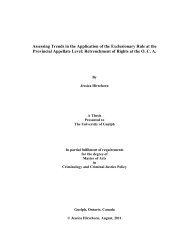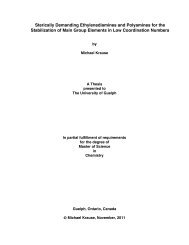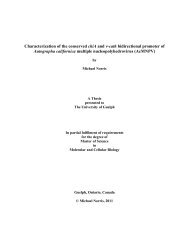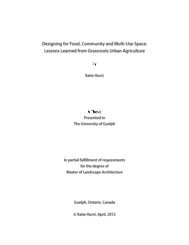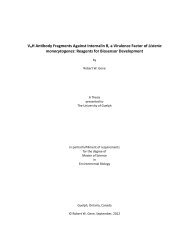- Page 1 and 2: Intergenerational Storytelling and
- Page 3 and 4: and strategies that emulate the sym
- Page 5 and 6: Abstract TABLE OF CONTENTS Acknowle
- Page 7 and 8: For other immigrants who desire to
- Page 9 and 10: elational, [and] transformative”
- Page 11 and 12: emphasizes the importance of active
- Page 13 and 14: attempts to narrate the old woman
- Page 15 and 16: ead her denoting truthful to mean a
- Page 17 and 18: theory and practice in counselling
- Page 19 and 20: that arise within intergenerational
- Page 21 and 22: events that defy narrative memory d
- Page 23 and 24: Fiction reveals how trauma transmit
- Page 25 and 26: suffered long histories of racial e
- Page 27: conceptualizations of the world - t
- Page 31 and 32: colonial oppression, cultural dislo
- Page 33 and 34: generational silences. Their interg
- Page 35 and 36: 117). Complexly marginalized throug
- Page 37 and 38: personal and/or transhistorical tra
- Page 39 and 40: characterizations of the old women
- Page 41 and 42: intergenerationally within the fami
- Page 43 and 44: age perspectives on one’s underst
- Page 45 and 46: diaspora, and intergenerational rel
- Page 47 and 48: the next 25 years. The percentage o
- Page 49 and 50: commonly held “belief that old ag
- Page 51 and 52: and individuality. Feminist Foucaul
- Page 53 and 54: Through her life review process, sh
- Page 55 and 56: more recent novels written by diasp
- Page 57 and 58: Unlike Hagar’s story, old raciali
- Page 59 and 60: Talk loudly and e-n-u-n-c-i-a-t-e.
- Page 61 and 62: LITERARY STUDIES ON REPRESENTATIONS
- Page 63 and 64: illustrates the specific challenges
- Page 65 and 66: Avey’s life review as “the fina
- Page 67 and 68: shifting dynamics in family relatio
- Page 69 and 70: Undoubtedly, literature performs as
- Page 71 and 72: against sexism and racism in femini
- Page 73 and 74: women highlight a power differentia
- Page 75 and 76: In de Beauvoir’s scathing objecti
- Page 77 and 78: highlighting three interrelated dim
- Page 79 and 80:
anti-ageist rhetoric. 30 Old racial
- Page 81 and 82:
emain un-verbalized, with the negat
- Page 83 and 84:
of the text and then as a listener
- Page 85 and 86:
women’s stories, in actuality, re
- Page 87 and 88:
Chapter 2 RECIPROCAL STORYTELLING I
- Page 89 and 90:
individual definition and of collec
- Page 91 and 92:
ecomes telling” (Goto 172), and t
- Page 93 and 94:
in the singular” (39). Marlene No
- Page 95 and 96:
Obachan’s daughter, Keiko, abando
- Page 97 and 98:
home, her mother Keiko proudly adop
- Page 99 and 100:
While Butler’s claim of universal
- Page 101 and 102:
later years (even if only perhaps i
- Page 103 and 104:
chain of slippery signifiers mergin
- Page 105 and 106:
story” (Goto 203). 40 Murasaki, f
- Page 107 and 108:
depending upon context, intention,
- Page 109 and 110:
autobiographical writing to include
- Page 111 and 112:
the narrator begins “Mukashi, muk
- Page 113 and 114:
These italicized sections make appa
- Page 115 and 116:
perspective shifts back to Obachan,
- Page 117 and 118:
appears in Japanese, such as “Ant
- Page 119 and 120:
Other narrative strategies and rhet
- Page 121 and 122:
words, possess the power to influen
- Page 123 and 124:
“but one link” in a “chain an
- Page 125 and 126:
heterogeneous expressions. The old
- Page 127 and 128:
Chapter 3 ARTICULATIONS OF TRAUMA I
- Page 129 and 130:
This chapter examines how these two
- Page 131 and 132:
Tamayose’s Basan, both live throu
- Page 133 and 134:
novel, Odori emphasizes the importa
- Page 135 and 136:
Kogawa’s novel details the long-t
- Page 137 and 138:
and speech. Kogawa “reveals the s
- Page 139 and 140:
Scream! Denial is gangrene” (Koga
- Page 141 and 142:
there is no further sound from her
- Page 143 and 144:
Emily, BA, MA, is a word warrior. S
- Page 145 and 146:
the body” (179) in Obasan as “b
- Page 147 and 148:
loose and drooping in a fold” (Ko
- Page 149 and 150:
unspeakable trauma. Torquato Tasso
- Page 151 and 152:
Daniel L. Schacter posits, “emoti
- Page 153 and 154:
understanding of the impact of trau
- Page 155 and 156:
eyond the shock of the first moment
- Page 157 and 158:
graces” (Tamayose 140). During th
- Page 159 and 160:
of earthly knowledge” and “pres
- Page 161 and 162:
explains, “If not you, then who?
- Page 163 and 164:
listen actively, that is to be crit
- Page 165 and 166:
next destination, “Okinawa” (24
- Page 167 and 168:
Unlike Naomi’s wounds that contin
- Page 169 and 170:
Kogawa’s metanarrative telling, w
- Page 171 and 172:
and after internment. Rather, what
- Page 173 and 174:
alienate them from any collective s
- Page 175 and 176:
social understandings. These sectio
- Page 177 and 178:
and negative consequences of patria
- Page 179 and 180:
THE MADWOMAN IN THE ALMS HOUSE Grac
- Page 181 and 182:
novel, Mootoo had “grown up heari
- Page 183 and 184:
perspective on Bertha’s social co
- Page 185 and 186:
entrapment in the stories of the es
- Page 187 and 188:
society and constitute the body pol
- Page 189 and 190:
Mootoo’s novel plays with “sema
- Page 191 and 192:
Despite so much critical attention,
- Page 193 and 194:
In Cereus Blooms at Night, the inte
- Page 195 and 196:
patriarchal order. His death disrup
- Page 197 and 198:
simultaneously, especially because
- Page 199 and 200:
epresentation and positions recipro
- Page 201 and 202:
ecause of factors such as gender, r
- Page 203 and 204:
May argues that Mala “willfully u
- Page 205 and 206:
eality. When the police finally dis
- Page 207 and 208:
The novel’s opening prologue intr
- Page 209 and 210:
postmodern refusal of objective kno
- Page 211 and 212:
memory lapse, but also by loss of l
- Page 213 and 214:
“And seagulls?” “Uhuh.” (87
- Page 215 and 216:
collaborative articulation with Tyl
- Page 217 and 218:
that Mala is, in fact, responsive t
- Page 219 and 220:
from the inner presence of her or h
- Page 221 and 222:
This narrative strategy positions r
- Page 223 and 224:
Chapter 5 ON TRANSHISTORICAL TRAUMA
- Page 225 and 226:
Chariandy employs the myth of the s
- Page 227 and 228:
directly to the impact of cultural
- Page 229 and 230:
versions and interpretations of his
- Page 231 and 232:
shaped by a history of colonial vio
- Page 233 and 234:
systems. When confronted to justify
- Page 235 and 236:
Chapter 4, Mootoo’s novel suggest
- Page 237 and 238:
history is inaccessible, “just a
- Page 239 and 240:
eader is reminded of who is speakin
- Page 241 and 242:
their own experiences of discrimina
- Page 243 and 244:
his article “The Fiction of Belon
- Page 245 and 246:
contained fashion, in order to mana
- Page 247 and 248:
Chariandy invites his readers to ex
- Page 249 and 250:
which refuses to acknowledge her eq
- Page 251 and 252:
This novel positions the old woman
- Page 253 and 254:
Adele’s matrilineal family histor
- Page 255 and 256:
witness to Adele’s childhood expe
- Page 257 and 258:
story with her interjections. At ti
- Page 259 and 260:
signifies sound “going out of exi
- Page 261 and 262:
of ‘traumatic dislocation’ and
- Page 263 and 264:
necessitates forms of remembrance t
- Page 265 and 266:
one person’s embodied “memories
- Page 267 and 268:
subject’s experience of an inheri
- Page 269 and 270:
Conclusion LITERATURE AS A SOCIAL S
- Page 271 and 272:
is that the privileging of memory b
- Page 273 and 274:
narrative, fiction provides readers
- Page 275 and 276:
gap. Fractured subjectivities attem
- Page 277 and 278:
history whereby a younger generatio
- Page 279 and 280:
tensions expressed in diasporic fic
- Page 281 and 282:
connected with the various spheres
- Page 283 and 284:
can offer belonging in a collective
- Page 285 and 286:
WORKS CITED Abraham, Nicolas, and M
- Page 287 and 288:
Bates, Judy Fong. The Year of Findi
- Page 289 and 290:
P, 2004. 57-74. ---. “It’s Time
- Page 291 and 292:
---. “The Flight from Certainty i
- Page 293 and 294:
canadienne: A Quarterly of Criticis
- Page 295 and 296:
Writing. New York: St. Martin’s,
- Page 297 and 298:
Literature. Piscataway Township, NJ
- Page 299 and 300:
Storytelling as an Institutional Pr
- Page 301 and 302:
Dependencies of Discourse. Ann Arbo
- Page 303 and 304:
Ray, Ruth E. “The Personal as Pol
- Page 305 and 306:
Texts at Home and in the Diaspora.
- Page 307 and 308:
---. Faking It: Poetics and Hybridi
- Page 309:
Canadian Lesbian Texts. Diss. Unive


